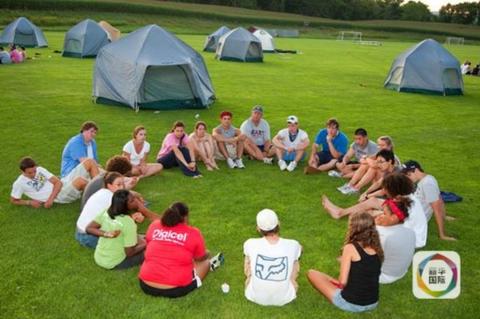


Summer camp, now a hit among young children from middle-class families in China, is estimated to turn over 20 to 30 billion yuan annually, with the market expected to swell to 400 billion yuan in the next five to ten years, China Newsweek reported on August 20.
In western countries, summer camps are an excellent way for students to spend their summer holidays and help working parents find something for their children to do. However, such activities have recently been promoted as an important event in China, with summer camps being deemed a must-do for every child.
Since the year 2000, outdoor activities have gradually expanded from enterprises to primary and middle schools after quality-oriented education was rolled out across China. Until 2009, the summer camps popular among Chinese students were channeled into three categories, learning, physical and mental training and study-touring.
In December 2016, the Ministry of Education and 10 other ministries jointly released a statement promoting study tours for primary and secondary school students, and the industry quickly took off.
Many summer camp organizers from abroad have spoken out about such factors as anxious Chinese parents’ stronger spending power and the mentality of blindly following any after-school education such as camp education, said Mrs Wang, a mother of three who has lived in the U.S. for over 10 years.
Wang explained that the facilities in domestic camps have now surpassed those in the U.S. However, she added that the most reputable U.S. camps depend not on their advanced facilities but instead on the quality of tutors.
She added that summer camp is just one of the options for American students deciding how to spend their summer holidays. About 14 million people in the United States, both parents and children, participate in summer camps every year according to 2013 American Camp Association data, indicating that summer camp students accounted for less than one-third of all school-age children that year.
China started to reward excellent students by sending them on excursions to the then Soviet Union in the early 1950s, marking the start of Chinese summer camps. In the eyes of the older generation, summer camps are still only for a small number of top students, but today, it seems more like good business, available to all.
 Fire brigade in Shanghai holds group wedding
Fire brigade in Shanghai holds group wedding Tourists enjoy ice sculptures in Datan Town, north China
Tourists enjoy ice sculptures in Datan Town, north China Sunset scenery of Dayan Pagoda in Xi'an
Sunset scenery of Dayan Pagoda in Xi'an Tourists have fun at scenic spot in Nanlong Town, NW China
Tourists have fun at scenic spot in Nanlong Town, NW China Harbin attracts tourists by making best use of ice in winter
Harbin attracts tourists by making best use of ice in winter In pics: FIS Alpine Ski Women's World Cup Slalom
In pics: FIS Alpine Ski Women's World Cup Slalom Black-necked cranes rest at reservoir in Lhunzhub County, Lhasa
Black-necked cranes rest at reservoir in Lhunzhub County, Lhasa China's FAST telescope will be available to foreign scientists in April
China's FAST telescope will be available to foreign scientists in April "She power" plays indispensable role in poverty alleviation
"She power" plays indispensable role in poverty alleviation Top 10 world news events of People's Daily in 2020
Top 10 world news events of People's Daily in 2020 Top 10 China news events of People's Daily in 2020
Top 10 China news events of People's Daily in 2020 Top 10 media buzzwords of 2020
Top 10 media buzzwords of 2020 Year-ender:10 major tourism stories of 2020
Year-ender:10 major tourism stories of 2020 No interference in Venezuelan issues
No interference in Venezuelan issues
 Biz prepares for trade spat
Biz prepares for trade spat
 Broadcasting Continent
Broadcasting Continent Australia wins Chinese CEOs as US loses
Australia wins Chinese CEOs as US loses